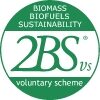Become certified
The path to certification
2BS certification process
Our sustainability certification enables certified players to market their products in Europe under the “sustainable” label.
The 2BSvs certifications (for the biofuel, biogas, waste & residues markets) have been developed to meet the requirements of the Renewable Energy Directive (RED II).
The 2BSXtra certification, dedicated to the food and feed industries, has been developed to help our customers value their sustainable practices in this sector.
We work with a network of independent certification bodies to ensure the conformity of the certification system. Moreover, our team is always available to help you if needed.
To access the European market and value your sustainable products in different industries, learn more about the certification process below!


The certification steps
1) First, create your profile by completing the registration form.
2) Once your account is complete and this stage has been validated, you need to sign a contract with a certification body referenced by 2BS.
3) You will then need to organise an audit file with all the requested documentation.
ATTENTION: preparation for the certification process can take up to 6 months, taking into account the time required to gather the documentation and site production data.
4) If needed, you can organise a blank audit.
5) The audit is carried out, and can obtain your certificate after validation by the certification body.
6) You pay your 2BS annual fee. To know your fee, check out our dedicated page.
Commitments after your certification
Once certified, your 2BS certificate is valid for 5 years, provided that the annual audits are organised.
These audits must be done every year on the anniversary date of the first certificate (with a two-month margin before and after this date).
Once certified, you commit to ensuring flow traceability, declaring your Proof of Sustainability (POS), and conducting follow-up audits.
Non-compliance with 2BSvs certification requirements
If you fail to comply with the requirements imposed by the certification, you will be considered non-compliant.
There are three levels of non-compliance: minor, major and critical. Each level of non-compliance has different penalties.
Read our standards and procedures to better understand the implications of each requirement and non-compliance.

